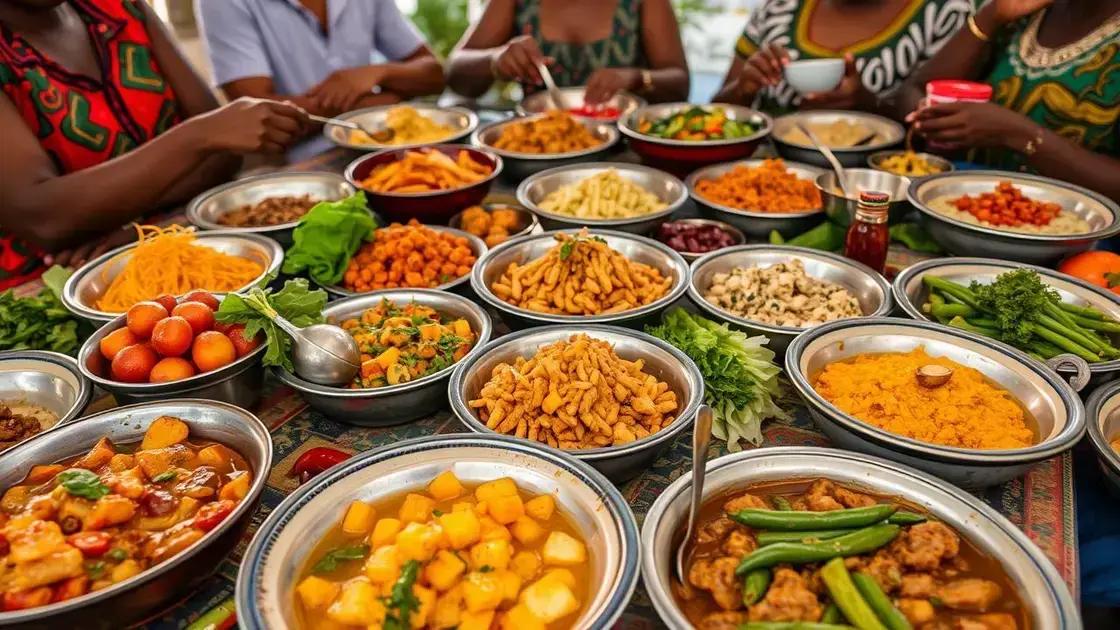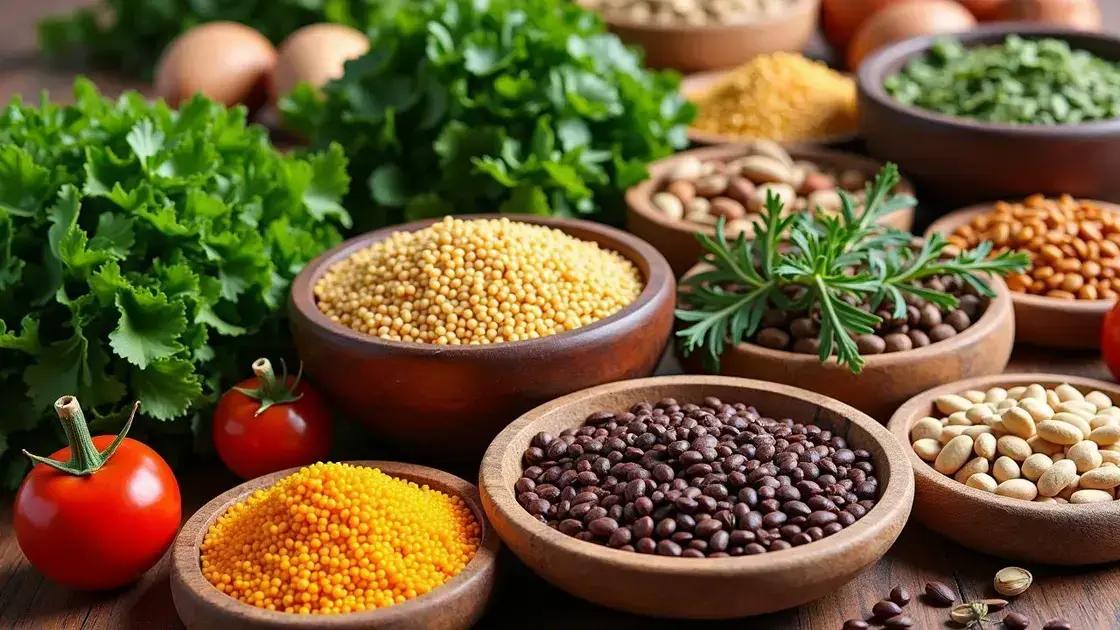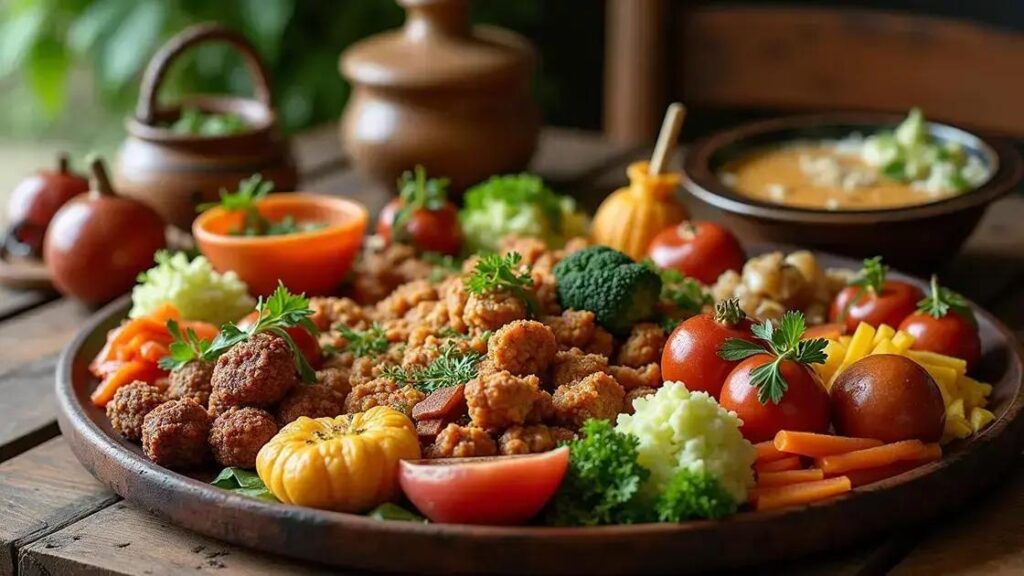The African recipe can significantly improve overall vitality by incorporating nutrient-rich ingredients such as legumes, whole grains, and fresh vegetables, enhancing health through diverse flavors and culinary traditions.
Can the African recipe improve overall vitality? Many people are now turning to traditional cuisines as a means to enhance their health and energy levels. The rich flavors and diverse ingredients used in African cooking hold secrets that may help invigorate your life. In this article, we will explore critical aspects such as the health benefits of African recipes, essential ingredients that promote vitality, and practical ways to incorporate these delicious meals into your daily diet.
Understanding African Recipes and Vitality

Understanding African recipes is essential to appreciate their role in promoting vitality and health. These recipes often incorporate a variety of fresh ingredients that provide vital nutrients for overall well-being. African cuisines are rich in flavors and traditions, establishing a connection between food and culture.
The Importance of Herbs and Spices
Many African dishes feature herbs and spices like ginger, garlic, and turmeric, which have anti-inflammatory properties. These ingredients are known to boost the immune system, helping your body fight off diseases.
Diverse Ingredients for Nutritional Benefits
African recipes often include beans, lentils, and whole grains such as millet and sorghum. These foods are packed with protein and fiber, promoting better digestion and keeping you full longer. Incorporating a variety of vegetables in these dishes adds essential vitamins and minerals.
Connection to Community and Well-being
African cooking emphasizes sharing meals, which fosters social connections. Eating together helps reduce stress and promotes mental health, contributing to a more vibrant life. Meals are often celebrated, creating a sense of community that enhances emotional well-being.
By understanding African recipes and their vibrant ingredients, you can take steps toward improving your vitality. The unique flavors, along with healthful ingredients, create a culinary experience that is not only delicious but also nourishing.
Key Ingredients for Improved Health

Key ingredients in African recipes play a significant role in enhancing health and vitality. Understanding these components can lead to better meal choices. Here are some key ingredients that you can include in your diet for improved health.
Leafy Greens
Leafy greens like kale and collard greens are abundant in African cuisines. They provide essential vitamins like A, C, and K, as well as minerals such as iron and calcium. These nutrients help in maintaining strong bones and a well-functioning immune system.
Legumes
Legumes, such as black beans, chickpeas, and lentils, are packed with protein and fiber. They support heart health and regulate blood sugar levels, making them a great choice for a balanced diet. Including legumes in African stews or salads adds texture and flavor.
Whole Grains
Whole grains like sorghum, millet, and teff are staples in many African recipes. These grains are rich in fiber, promoting healthy digestion and keeping you fuller for a longer time. They are also a source of energy and can be included in various dishes.
Nuts and Seeds
Nuts and seeds are often used as toppings or ingredients in African meals. They provide healthy fats and protein, which can help reduce cholesterol levels and improve heart health. Consider adding pumpkin seeds, sunflower seeds, or cashews to your meals for a nutritious boost.
By incorporating these key ingredients into your cooking, you can take significant steps towards improving your overall health and vitality while enjoying the rich flavors of African cuisine.
Practical Tips for Incorporating African Cuisine

Incorporating African cuisine into your diet can be exciting and rewarding. Here are some practical tips to help you enjoy these vibrant flavors while improving your overall health.
Start with Simple Recipes
Begin with easier recipes that highlight key ingredients. Dishes like jollof rice or bean stews require minimal preparation and are delicious. Once you feel comfortable, try more complex dishes that showcase a variety of flavors.
Experiment with Spices and Herbs
Using spices and herbs is essential in African cooking. Ingredients like cumin, paprika, and coriander can enhance your dishes significantly. Don’t be afraid to mix and match different spices to find your favorite flavor profiles.
Incorporate Local Ingredients
Visit local markets to find fresh produce and unique ingredients. Look for yams, plantains, and a variety of beans and legumes. Using seasonal local ingredients will elevate the taste of your dishes while supporting local farmers.
Join a Cooking Class or Workshop
Taking a cooking class can be a fun way to learn more about African cuisine. Many communities offer classes that focus on traditional cooking techniques. This hands-on experience can make you feel more confident in preparing these dishes.
Share Your Meals
Food brings people together. Share your African-inspired meals with friends and family to create a sense of community. This approach not only enhances your cooking skills but can also spark interest in African cuisine among others.
By following these practical tips, you can easily incorporate African recipes into your lifestyle and enjoy their health benefits while savoring new and exciting flavors.
Embracing African Cuisine for Enhanced Vitality
Incorporating African recipes into your diet can be a transformative journey towards improved health and vitality. With the understanding of key ingredients, the importance of fresh produce, and the exciting flavors of African cuisine, you can create meals that nourish both body and mind.
By trying simple recipes, experimenting with spices, and connecting with local ingredients, you can enjoy the benefits that come from these diverse and colorful dishes. Sharing meals with family and friends not only enhances your culinary experiences but also fosters a sense of community.
Consider making African cuisine a regular part of your diet to explore new flavors and health benefits. By doing so, you can find new joy in cooking and improve your overall vitality in an enjoyable way.
FAQ – Frequently Asked Questions about African Cuisine and Vitality
How can African recipes improve my overall health?
African recipes often include nutrient-rich ingredients like legumes, whole grains, and fresh vegetables that promote better health and vitality.
What are some key ingredients in African cuisine?
Key ingredients include leafy greens, legumes, whole grains, nuts, and spices, all of which contribute to improved health.
Are there simple African recipes I can try at home?
Yes, simple recipes like jollof rice, bean stew, and plantain dishes are great starting points for incorporating African cuisine.
How can I incorporate African cuisine into my daily meals?
Start by trying easy recipes, experimenting with spices, and using local, fresh ingredients to add variety to your meals.
What health benefits do traditional African ingredients provide?
Many traditional African ingredients, like herbs and spices, have anti-inflammatory properties and provide essential vitamins and minerals.
Can I find African cooking classes in my local area?
Yes, many communities offer cooking classes focusing on African cuisine, which can enhance your cooking skills and knowledge.













